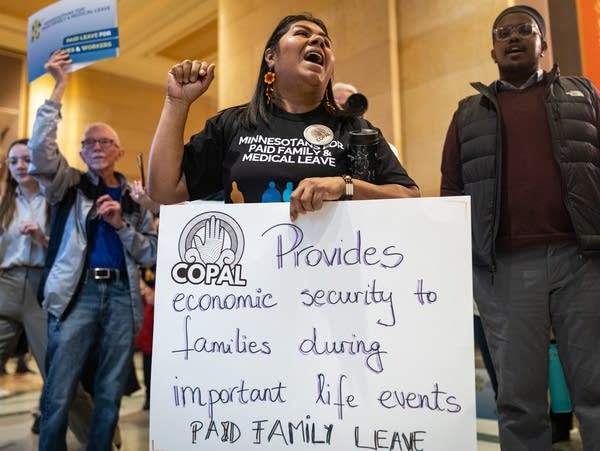[ad_1]
Minnesota’s Senate moved Monday to soften a proposed universal requirement for paid family and medical leave. It would give some employers slightly more flexibility in crafting plans while still assuring workers time off during major life events.
The bill is a key priority of legislative Democrats; a version narrowly passed in the House last week. If a final measure is approved within the next few weeks, the partial wage replacement structure would take a few years to get into place. It relies on a payroll tax on employers and employees, similar to other paycheck withholdings.
The Senate bill’s author, DFLer Alice Mann of Edina, said providing broader family and medical leave to Minnesota workers could improve maternal and child health outcomes, as well as financial security. And it could encourage workers to stay in their jobs longer, she said.
“This program is going to even the playing field,” Mann said. “It will keep people out of poverty and most importantly, this program is built on a foundation that we are all worthy, that all of our experiences and life trajectories are equally important.”
MPR News is Member supported public media. Show your support during the Spring Member Drive, donate, and ensure access to local news and in-depth conversations for everyone.

Claudia Lainez, a coordinator with COPAL, leads chants during a rally at the State Capitol in St. Paul on Monday.
Ben Hovland | MPR News
Early in Monday’s debate, Mann successfully amended her bill to more clearly define a benefit year — that matters because allowable weeks off would be capped annually — and give companies with out-of-state operations comfort that only workers who spend most of their time in Minnesota would be covered. It also would provide money to help offset costs of certain health care workers already facing workforce recruiting challenges.
Ahead of the debate, Sen. Julia Coleman, R-Waconia, urged DFLers to adopt a program that would allow the creation of a paid family and medical leave insurance policy. And it would fund credits for small businesses that offered paid leave benefits to their employees.
“While we believe expanding access to paid family leave, is the right thing to do, we don’t believe that the Democrats one-size-fits-all mandate, a new tax, billions in spending and a massive new government bureaucracy that will crush our small businesses, hurt our teacher shortage issue and make life for Minnesota even tougher is the right way to go about it,” she said.
The Senate rejected Coleman’s plan by a party line 33-34 vote.
Some small business owners and school leaders on Monday said the plan would pose a significant burden to their bottom line and could create problems in finding temporary workers.

Business owner Jodi Theis of Waconia spoke against the proposed paid family and medical leave bill Monday at the Capitol.
Dana Ferguson | MPR News
“I’m concerned on how this is going to affect my bottom line,” said Jodi Theis, owner of Paws Inn Pet Essentials in Waconia, Minn. “How am I going to be able to continue staffing as it’s a struggle already?”
Stillwater area schools superintendent Mike Funk said he supported providing paid family and medical leave for workers, but the payroll tax that would fund it and unknown expenses for finding replacement workers would pose a significant expense to school districts. Funk said the district expected to pay $240,000 a year for the program.
“With over 1,000 employees, the financial impact of this bill could be very significant, and leave us less resources to compensate our employees fairly in other areas,” Funk said. “The opportunity cost to our students from this mandate could be significant.”
Supporters, including faith leaders, labor unions, health care providers and people who lacked paid leave through their employers rallied at the Capitol Monday ahead of the debate. And they said many Minnesotans lack access to paid leave benefits through their work but could benefit from a statewide program.

Abdulahi Farah, lead organizer at ISAIAH, leads supporters of paid family leave Monday.
Ben Hovland | MPR News
Samie Burnett was working at a school when her infant daughter got sick and had to go to the hospital two years ago. Burnett said she had to choose between taking unpaid time off to be with her daughter or running a virtual class from her cell phone.
“We had to stay an extra day. So we got released Tuesday instead of Monday, I literally clocked into work from my phone, and was doing classes from my phone while in the hospital waiting to be released. And that’s not okay,” Burnett said.
Minnesota would join 12 other states with paid family and medical leave programs if the Legislature approves the bill and the governor signs it into law.
[ad_2]
Source link
